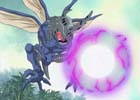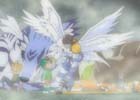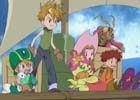Digimon Adventure
| Also Known As: Digimon 01, Digimon Adventure 01, Digimon: Digital Monsters (NA Release) | ||
| Genre: Action/Drama | ||
| Format: 54 Episodes | ||
| Allegiance: Fuji TV/Toei Animation | ||
| Director: Kakudou Hiroyuki | ||
| Vintage: 1999 – 2000 | ||
| Intelligence Agency Report by: Kuzu Ryu Sen | ||
| Recently, the world has been plagued by some drastically abnormal weather, but no one is giving it too much thought, especially not seven kids off in the Japanese countryside at a summer camp. However, one day, a freak snowstorm blows in, and as Yagami Taichi, Takenouchi Sora, Ishida Yamato, Izumi Koushirou, Kido Jou, Tachikawa Mimi, and Takaishi Takeru leave their cabin to investigate, seven streaks of light descend from the sky. Before the children can investigate the strange devices contained within the light, a tidal wave strikes, and the children are transported to a strange world inhabited by even stranger creatures who call themselves “Digimon.” Little do they know that this would be the start of an adventure which would determine the very fate of their world. | ||
|
|
||
| Field Agent Report by: Kuzu Ryu Sen | ||
| Plot Characters Impact Visual Audio |
7.50 7.50 8.00 5.50 7.50 |
|
| Overall | 7.50 | |
| (not an average) | ||
Digimon Adventure, re-termed Digimon: Digital Monsters (a moniker applied for all its sequels/spinoffs as well), was a part of the anime invasion of the early 1990s. For once, FOX Kids didn’t deceive or mislead anyone, for make no mistake: this is a children’s show. Yet it’s a cut above the majority of children’s programming out there. While the moralistic and one dimensional good vs. evil plotline is there, the show doesn’t gloss over mature social issues. The characters are rather likable and the plot is surprisingly complex and, most importantly, well-paced. As such, Digimon Adventure makes for exciting and fun viewing, albeit nothing that you’ll really rack your brain over.
The plot to Digimon Adventure should be analyzed in two components: intra- and inter-episode. The general plot to each individual episode, like in most programming aimed at younger audiences, is utterly predictable, even to the point of being able to discern plot events from what background music is being played. However, the greater plot, aside from the climactic (and I use the term very loosely) final battles of each arc, is well paced. It is also fairly well written with a few twists here and there, particularly during the Vamdemon (Myotismon) Arc, the high point of the series. The plot also facilitated a relatively high level of characterization by splitting up the seven character main group into smaller fragments at various times, allowing characters to receive more concentrated attention without creating a “of the week” scenario.
The visuals are somewhat disappointing, even with low expectations going in. After all, Digimon Adventure’s primary goal was ratings, not artistic renown. Still, the sheer amount of reused animation, the time wasted on evolution sequences, and the inconsistencies in the artwork from scene to scene, let alone episode to episode, were very noticeable. The animators do get points for the amount of detail that was included in the backgrounds, particularly in the urban settings, but the deformed character designs and the cost-cutting tip the balance towards the negative. The song selection was pretty good, but points are lost for reusing “Brave-heart” over and over and over and… over.
Digimon Adventure will not win awards. It won’t blow your mind away with psychoanalysis or melodrama. It won’t make you cry, shout, scream, or think. However, if you keep an open mind (in as many ways as possible), it will make you smile. Bad animation and intra-episode plotlines aren’t enough to offset a good plot, strong characters, and catch music and render this show unwatchable. Heck, it’s not even corny. Prodigious, isn’t it?




